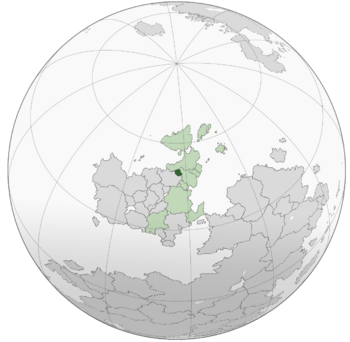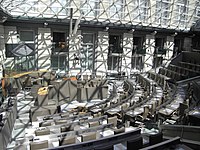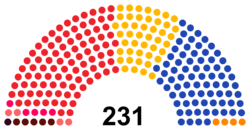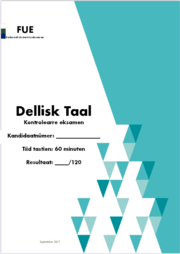Alsland: Difference between revisions
mNo edit summary |
No edit summary |
||
| Line 273: | Line 273: | ||
===Health=== | ===Health=== | ||
[[File:B-Lichterfelde Hindenburgdamm Klinikum.jpg|thumb|right|180px|The Siemen Hartmann Memorial Hospital is the largest in Alsland.]] | [[File:B-Lichterfelde Hindenburgdamm Klinikum.jpg|thumb|right|180px|The Siemen Hartmann Memorial Hospital is the largest in Alsland.]] | ||
Alslanders on average enjoy a good quality of health. Most estimates have the country's life expectancy at 82 years. Death in Alsland is mainly due to Heart conditions and other natural causes however Non-Natural causes of death are the main reason for deaths between Alslanders from ages 18 to 32. | |||
Alsland has a {{wpl|Universal health care}} system which has been running since the end of the Great War. Private Hospitals however exist and sometimes receive government subsidies. | |||
{{Wpl|Euthanasia}} is legal in Alsland following a referendum in 2013. The first person to be Euthanised in Alsland took place in early 2014. The topic is highly controversial within the country due to concerns about assisted suicide with major federal politicians calling for an end to Euthanasia including the country's current Prime Minister, Lilliana Elliott. | |||
===Education=== | ===Education=== | ||
[[File:FUE Exam Paper example.png|thumb|left|180px|An example of the 2017 FUE exam paper in Yndyk.]] | [[File:FUE Exam Paper example.png|thumb|left|180px|An example of the 2017 FUE exam paper in Yndyk.]] | ||
Revision as of 21:15, 6 December 2020
This article is incomplete because it is pending further input from participants, or it is a work-in-progress by one author. Please comment on this article's talk page to share your input, comments and questions. Note: To contribute to this article, you may need to seek help from the author(s) of this page. |
United Provinces of Alsland | |
|---|---|
| Motto: Tegearre (Dellish) Zusammen (Weranian) Koos (Kirenian) Together | |
| Anthem: Alle dingen ljocht en moai (Dellish) All things Bright and Beautiful | |
 Alsland (dark green) in Euclea (light green and dark grey) and in the Euclean Community (light green). | |
| Capital and largest city | Yndyk |
| Official languages | Dellish Weranian Estmerish |
| Recognised regional languages | Kirenian |
| Demonym(s) | Alish |
| Government | Federal Parliamentary Republic |
• President | Hepke Veltman |
• Prime Minister | Liliana Elliott |
• Co-Deputy Prime Ministers | Jochen Scheffler Jolke Dekker |
| Legislature | National Assembly |
| Senate | |
| House of Representatives | |
| Independence from Kirenia | |
• Declared | 1919 |
• Recognised | 1921 |
| Area | |
• | 46,789 km2 (18,065 sq mi) |
• Water (%) | TBD |
| Population | |
• 2020 estimate | 11,501,738 |
• 2019 census | 11,384,499 |
• Density | 243/km2 (629.4/sq mi) |
| GDP (PPP) | 2020 estimate |
• Total | €564.5 Billion |
• Per capita | €49,583 |
| GDP (nominal) | 2020 estimate |
• Total | €539.3 Billion |
• Per capita | €47,374 |
| Gini (2020) | 34 medium |
| HDI (2020) | very high |
| Currency | (€) Euclo (EUC) |
| Date format | dd-mm-yyyy |
| Driving side | right |
| Calling code | +32 |
| Internet TLD | .as |
Alsland, officially the United Provinces of Alsland is a country in Northern Euclea. It is bordered by Werania to the north, Estmere to the east and Kirenia to the west. It covers an area of TBD km2 (TBD sq mi) and has a population of more than 11.5 million. The capital and largest city is Yndyk; other major cities are Wottested, Werdau, Kirchester, Glauchau, Leens, Hurdegaryp, and Ilfracombe.
Alsland is divided into 8 autonomous provinces. Delland, Garz, Hamptonshire, Yndyk, Wottested, Fawkhamshire, Zittau and Martiland. Wottested is the smallest province and the youngest after voting to secede from Delland in a 1994 referendum. Yndyk is the richest and most densely populated province along with being the capital and largest city.
Alsland is home to four distinct communities. The Dellish speaking community primarily in the centre of the country, the Estmerish speaking community in the east of the country, the Weranian speaking community in the north and the Kirenian communities along the border with Kirenia.
PRE-20TH CENTURY STUFF TBD
Following independence, tensions rose within the country, fueled by rising political and economic inequality faced by the Non-Dellish population. The Great War brought a temporary end to the tensions as the country was occupied by Gaullica. Following the end of the Great War, reforms were introduced transitioning Alsland into a federal system and most nationalist support fell off between the 1940s and 1960s. Alsland joined the Euclean Community in 1955
Alsland is a liberal democracy with a mixed market economy; Alsland's welfare state also provides subsidised Education and Healthcare. The country is a member of the Euclean Community and the Community of Nations. The country is considered to have a 'very high' and has a High average income.
Etymology
History
Prehistory
- TBD
Weranic tribes
- TBD
Early Middle ages
- TBD
Middle ages
- TBD
Kirenian rule
- TBD
Independence and Beyond

- Declaration of Independence
- Estmerish and Weranian involvement
- Independence recognised
Upon the outbreak of hostilities in Euclea. Prime Minister Viktor Funke declared that Alsland would remain a neutral country and refused to join either side. Funke later announced his resignation and he was replaced by Tsjaable Wouda in a landslide victory. Wouda clarified he sought to keep Alsland neutral although measures were taken against the People's Party of Alsland, a functionalist party which had been active in Alsland and had won seats in the 1928 election. On XX, XX 19XX at 17:58 Gaullican troops crossed the border from occupied Estmere into Fawkhamshire. Initial reports suggested that a small number of Gaullican forces had accidentally crossed the border into Alsland. Shortly after this it became clear that Gaullica had invaded the country as an air raid was conducted over Yndyk and Wottested. The Prime Minister's residence was hit in the air raid but Funke was in Leens at the time. In an emergency meeting the Alish Parliament agreed to surrender to the Gaullican army to prevent further losses of life. Alsland surrendered on XX, less than 24 hours after the invasion began. Wouda was allowed to serve as the head of a civilian government in Yndyk.
20 days after the invasion, members of the DFK, took Wouda hostage and forced him to resign and appoint Sarbe Hoeksma as Prime Minister. Wouda agreed and went into hiding with his family. Following the coup many members of Parliament resigned, Hoeksma replaced them with members of the People's Party. The People's Party controlled Parliament granted Hoeksma emergency powers which he used to suspend the constitution.
On December 20 1931, Hoeksma was assasinated and Anton Attema succeeded him as Prime Minister. Attema announced a crackdown on resistance to the government and over 1000 suspected Resistance members were arrested and executed in the following months. This had the opposite effect as support for the resistance skyrocketed.
On XX XX 1934, Kirenian forces crossed the Kirenia-Alsland border and began moving through Alsland with the Government in-exile's permission. The Alsland campaign was bloody and the city of Wottested was almost completely levelled in the Battle of Wottested. Estimates put the civilian casualties of the Liberation at nearly 30 thousand. Following the Battle of Wottested which ended in a Kirenian victory, the Alish resistance with Grand Alliance support, began several large scale uprisings, most notably the Kirchester Uprising when the city and surrounding areas surrendered to resistance forces. The city was then subject to shelling by Entente forces in Alsland. The Alish Government led by Attema surrendered shortly after the Battle of Yndyk. Attema attempted suicide in captivity but failed and was put on trial and executed in Alsland's post-war trials.
Following the war, the Alish Government, now led by Villem Mand, began the task of reconstruction. Several important cities in Alsland were destroyed in the liberation and Alsland's industrial capabilities were gone. Mand and his national-unity government began the country's reconstruction. Mand's reforms were key in Alsland's economic recovery. Mand did not seek re-election in 1939 and was succeded by his Finance Secretary, Sjemme Boersma.
Boersma continued his economic plans and by 1945, Alsland's economy had fully recovered and reconstruction was nearly completed. Boersma was forced to resign in 1942 however due to a Party Donation scandal and was replaced by Djurre De Vos, Alsland's President during the invasion until Hoeksma took power. De Vos had a heart attack and died a week into his role as Prime Minister. De Vos was replaced by Laas Keuning. Keuning was largely seen as a continuity Prime Minister from Boersma, going so far to reappoint Boersma as his Finance Secretary. Boersma and his Conservative Party were defeated by the Socialist Party by Samuel Hudson. Hudson and his successors were instrumental in Alsland's ascension to the Euclean Community in 1955.
Eric Feigenspan became Prime Minister in 1960. Feigenspan's premiership would see the official formation of Alsland's two major political blocs. The Centre-Right 'National Bloc' and the Centre-Left 'Progressive Alliance'. Feigenspan resigned in 1962 and Konrad Neuheuser was chosen to replace him. Neuheuser was controversial due to his membership in the People's Party before and during the war, Neuheuser was an advisor to the Party's Financial spokesperson. His connections to the People's Party led to him being forced out of office. He was replaced by Marshall Harvey who was Prime Minister from 1964 to 1975. Harvey's premiership was dominated by the 'Fawkhamshire Incident'. Harvey's Brother-in-law was Minister-President of Fawkhamshire and audio tapes were leaked to the press that showed Harvey approving the use of Federal Funds towards his re-election bid in 1973. Harvey announced he would not be running for a third term after this. The Progressive Alliance returned to power in 1975 and Urseltsje Van Der Hoek became Prime Minister becoming Alsland's first female Prime Minister. She chose to resign in 1976, less than one year into her term, after several demonstrators were killed in an anti-government protest in Martiland. The incident led to major instability within the Progressive Alliance and the country had 3 Progressive Alliance Prime Ministers in the aftermath of this. The National Bloc would win the 1985 General Election with a promise to return to normality.
In 1990 the Progressive Alliance were returned to power in the first of 3 landslide victories for the Alliance, 1990, 1995 and 2000. Adalbrecht Brötzmann was Prime Minister from 1990 to 2000 and was seen as a modernising figure. Under Brötzmann the economy grew at rates not seen since the aftermath of the Great War. Brötzmann did not seek a third term and was replaced by Bonne Zijlstra who was Prime Minister from 2000-2004. Zijlstra resigned in 2004 after the death of his wife in a car accident. Zijlstra's successor was Martina Scott, the former mayor of Ilfracombe. Scott's short premiership was dominated by the beginning of the great recession which hit Alsland particularly hard. Scott's government implemented austerity to try and recover although this lead to wide public outrage and mass demonstrations. A general strike was called at the start of April and the ruling Progressive Alliance were defeated in a landslide by the Left-wing Euclosceptic Worker's Party, led by Jabik Nieuwenhuis. Nieuwenhuis' government reversed Scott's austerity policies and increased taxes leading to increased tension. Nieuwenhuis was removed from office by President Onne Monsma prompting the largest constitutional crisis in Alish history that also led to Monsma being impeached and removed from office. Nieuwenhuis was replaced by Jochen Schünemann who resigned following Monsma's impeachment.
Asser Toman would become Prime Minister in the aftermath of Schünemann and Monsma's departure. Toman was able to form a stable national-unity government with the Progressive Alliance and other parties from 2008 to 2010 when Jonathan Fraser became Prime Minister. Fraser was the country's first openly Gay Prime Minister and his premiership oversaw the recognition of LGBT marriages and total marriage equality. Fraser was also credited for Alsland's economic recovery. Despite this he suffered a vote of no confidence in 2014 and was replaced by Aarnd Hellinga who resigned during the 2015 General Election after losing his own seat. Aachtsje Wieringa became Prime Minister in 2015. Wieringa retired in 2017.
Geography
Geology
Climate
Rivers
Nature
Politics and Government
Government
Provinces
Foreign relations
Armed Forces
Economy
Agriculture
Tourism
Energy
Transport
Science and technology
Demographics
Ethnic Groups
Largest cities
Largest cities in Alsland
2013 Census | |||||||||
|---|---|---|---|---|---|---|---|---|---|
| Rank | Provinces | Pop. | |||||||
 Yndyk  Wottested |
1 | Yndyk | Yndyk | TBD |  Werdau  Kirchester | ||||
| 2 | Wottested | Wottested | TBD | ||||||
| 3 | Werdau | Garz | TBD | ||||||
| 4 | Kirchester | Hamptonshire | TBD | ||||||
| 5 | Hurdegaryp | Delland | TBD | ||||||
| 6 | Glauchau | Zittau | TBD | ||||||
| 7 | Leens | Delland | TBD | ||||||
| 8 | Ilfracombe | Fawkhamshire | TBD | ||||||
| 9 | Rahu | Martiland | TBD | ||||||
| 10 | Rikertsted | Delland | TBD | ||||||
Language
Alsland has three official languages and one regional language: Dellish, Weranian and Estmerish. Kirenian is mainly spoke in Martiland. At the last census the Dellish language was the largest with 34% of Alslanders speaking it as their first language. 28% said they spoke Weranian as their first language and 23% said they spoke Estmerish as their first language.
The number of Dellish speakers is about 3,870,729 mainly in the provinces of Delland, Yndyk and Wottested. The number of Weranian speakers is about 3,221,813 mainly in the Garz and Zittau provinces. The province of Wottested has a large number of Weranian speakers in the north. The number of Estmerish speakers was 2,663,972 at the last census. The Estmerish language is mainly spoken in the Fawkhamshire and Hamptonshire provinces along the border with Estmere. Kirenian speakers numbered 1,013,220 at the last census. Almost all of them residing in Martiland or small areas of Delland and Yndyk. Kirenian was widely spoken during Kirenia's rule of Alsland although it's usage has declined following independence.
Both Alish Weranian and Alish Estmerish have minor vocabulary differences from the languages spoken in their respective countries.
Religion
Health
Alslanders on average enjoy a good quality of health. Most estimates have the country's life expectancy at 82 years. Death in Alsland is mainly due to Heart conditions and other natural causes however Non-Natural causes of death are the main reason for deaths between Alslanders from ages 18 to 32.
Alsland has a Universal health care system which has been running since the end of the Great War. Private Hospitals however exist and sometimes receive government subsidies.
Euthanasia is legal in Alsland following a referendum in 2013. The first person to be Euthanised in Alsland took place in early 2014. The topic is highly controversial within the country due to concerns about assisted suicide with major federal politicians calling for an end to Euthanasia including the country's current Prime Minister, Lilliana Elliott.
Education
Education is compulsory from ages 6-18 for Alslanders.
Primary education is from ages 6-12 and is split into 6 grades. Children in 6th grade are required to take the NUW exam at age 12 to determine whether they can progress to Secondary education. Based on their results in the NUW exams, children are given a selection of several secondary schools in their area.
Secondary education in Alsland is mandatory from ages 12-18 and is split into 6 grades from 7th grade to 12th grade. Some secondary schools are divided into Junior schools and Senior schools. Junior schools are open to children aged 12-15 and senior schools are open to ages 15-18. In 12th grade all Students are required to take the FUE examinations. The FUE examinations are used to decide if a student can enrol in Post-Secondary education.
Alsland has a high level of enrolment in Post-Secondary education, about 45% of all students progress onto Post-Secondary education making Alsland the Xth in the world for highest post-secondary enrolment.








